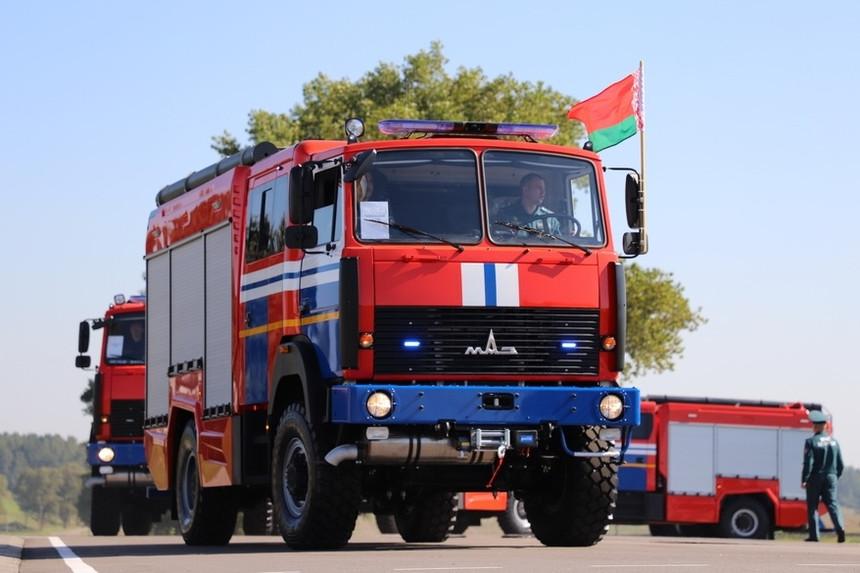Lithuania wants to hand over to Ukraine Belarusian fire-fighting vehicles that were intercepted when shipped from Belarus to Zimbabwe. This was reported by the Baltic News Service (BNS) on September 21. Lithuanian authorities seized the Belarusian vehicles in March 2023, the publication said, citing Zimbabwean resource ZimLive. Lithuanian Prosecutor General Nida Grunskienė said 17 vehicles were seized because their manufacturer was allegedly under EU sanctions. The BIC has investigated the nature of the sanctions evasion and found similar scheme.
Partly under sanctions
The Zimbabwean web portal ZimLive wrote about a major contract to supply Belarusian fire-fighting vehicles to Zimbabwe in June 2022. The publication also mentioned the manufacturer – the limited liability company Pozhsnab. In the news regarding the seizure of 17 ordered fire-fighting vehicles in Lithuania, the supplier was identified as Red Lion. However, this is likely the name of a fire-fighting vehicle model produced by Pozhsnab.
EU sanctions were not imposed on this company, but OAO Minskyi Avtomobilnyi Zavod, the management company of BELAVTOMAZ Holding (MAZ), has been subject to restrictions since 21 June. MAZ, judging by the model descriptions (1, 2), produces chassis for the Red Lion fire-tankers.
The fire-fighting vehicles and other MAZ equipment described above are shipped to Africa via Lithuania by the Emirati company Aftrade DMCC, which is linked to the Belarusian businessman Alexander Zingman. To avoid problems at the port of Klaipeda, this exporter has come up with a trick.
A fake Belarusian "African"
In 2019, Aftrade DMCC signed a $2.3 million contract to supply MAZ buses to the West African republic of Togo. The model in question is the MAZ-131020, dubbed "African" in the press. This vehicle was designed in 2016 especially for developing countries and bad roads.
However, the contract in its original form was not fulfilled. According to correspondence obtained by the BIC from an industry source, after the EU sanctions were imposed on MAZ, Aftrade DMCC asked the company to return the advance payment and renegotiated the contract for the supply of buses with another Belarusian company – OOO Eton. Documents obtained by the BIC indicate that the new supplier is a fictitious entity through which the same MAZ buses were sold under a different name.
Markup for Togo
In October 2021, a SuB 131 model with identical specifications was listed on the Aftrade DMCC website instead of the MAZ 131020 bus. Aftrade DMCC correspondence, accessed by BIC investigators, indicates that the company requested MAZ to remove all references to the Togolese bus from its website and catalogues in all languages. Concurrently, Aftrade DMCC requested that OOO Eton amend its website to reflect the "correct name" – SuB 131 – and remove all references to MAZ. However, it was MAZ employees who provided training to the Togolese professionals on servicing the vehicles, conducted repairs on the damaged bus, and addressed all related issues.
In January 2022, Aftrade DMCC delivered 22 SuB 131 buses to Togo. The ceremony, which was attended by the Belarusian Minister of Industry Piotr Parkhomchyk, marked the successful delivery of the vehicles to the Tongolese carrier SOTRAL, and demonstrated the significance of this deal for the Belarusian authorities.
Aftrade DMCC sold the Belarusian buses to Aftrade DMCC for a price of $98,000 per unit, which is almost twice the amount it originally paid for them. In addition to the buses, the Emirati company supplied Togo with spare parts for them. As evidenced in the company's internal correspondence records, the markup on these parts ranged from 20% to 250% of the purchase price. MAZ removed its markings on the spare parts for the buses and transferred them to Eton to conceal the origin of the goods.




